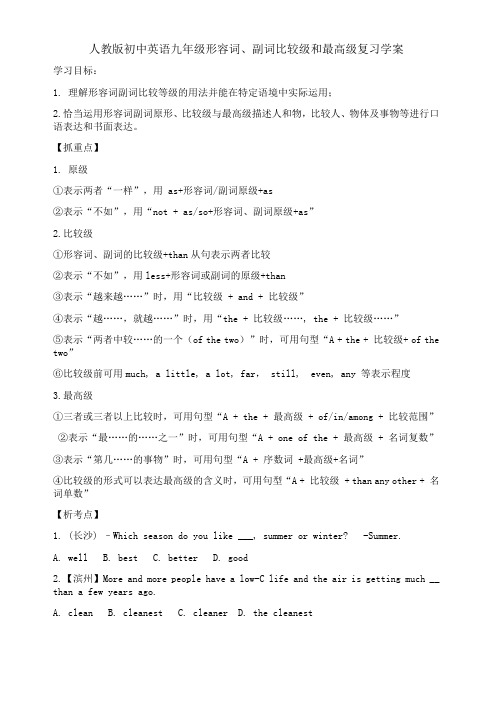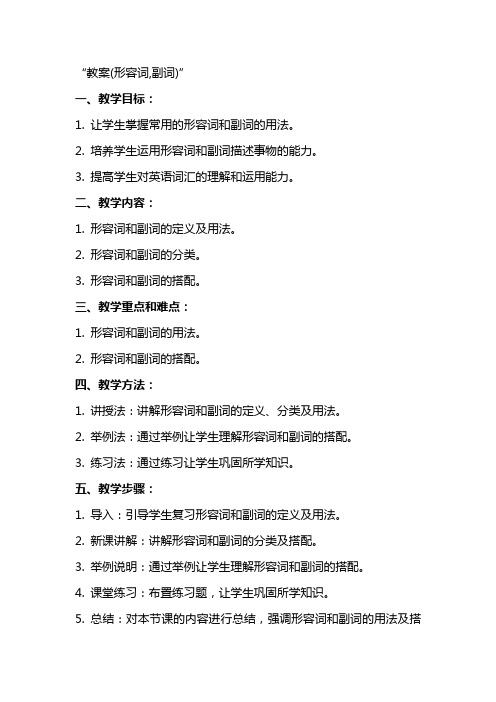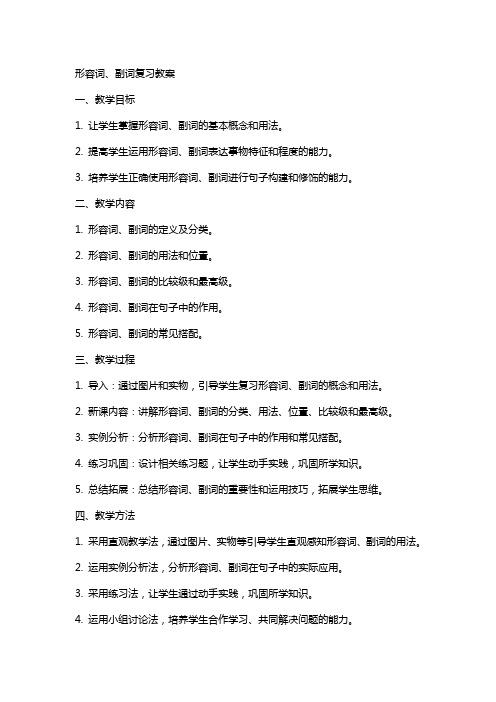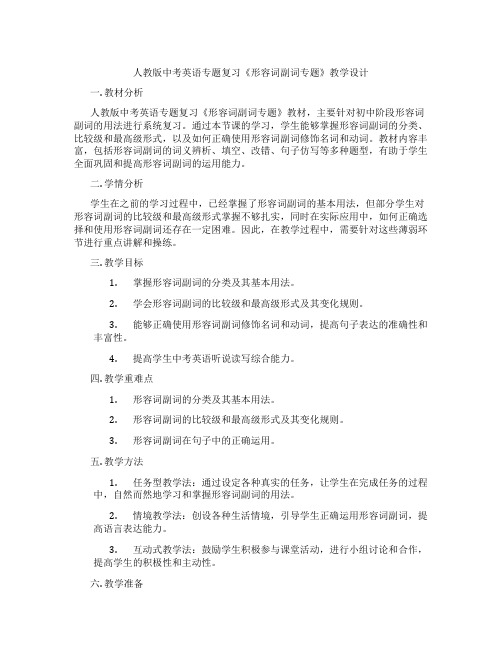英语人教版九年级全册形容词和副词教案
英语人教版九年级全册形容词和副词教案

2017中考专题复习形容词和副词(一)形容词1. 形容词的概念形容词是描述人和事物的特征、性质、属性或状态的词。
它一般是用来修饰限定名词和代词在句中作定语表语和补足语。
(1)作定语放在所修饰名词的前面beautiful: beautiful girl★注意当形容词修饰something,anything,nothing,somebody,anybody等不定代词时要放在这些不定代词的后面。
Important: something important(2)作表语(一般都是放在be动词的后面)The film very interesting. (×)The film is very interesting.这部电影很有趣。
(3)作宾语补足语(中学阶段一般make, keep考得最多)The film today makes me very relaxed今天的电影让我很放松We should keep our classroom clean.我们应该保持我们的教室清洁。
(4)形容词的一些特殊用法①有一些形容词只能作表语,不能作前置定语。
例如:afraid(害怕的),alive(活着的),alone(单独的)。
②the加上某些形容词,表示一类人或事物(相当于一个复数名词) 。
例如:the young (年轻人),the rich(富人),the poor (穷人)。
The old need more care than the young.(二)副词1.副词的概念:副词是指在句子中表示行为或状态特征的词,用以修饰动词、形容词、其他副词或句子,表示时间、地点、程度、方式等概念。
2.副词的位置(1)副词修饰动词时,通常可以放在句首、句中或句末。
例如:Usually, I do my homework in the evening.通常我在晚上做家庭作业。
I often get up at six in the morning. 我经常在早晨6点起床。
九年级英语专题复习教案:形容词和副词知识讲解

九年级英语专题复习教案:形容词和副词知识讲解一、教学目标:1. 让学生掌握形容词和副词的基本概念和用法。
2. 培养学生正确运用形容词和副词表达事物特征和程度的能力。
3. 提高学生英语写作和口语表达能力。
二、教学内容:1. 形容词和副词的定义及分类。
2. 形容词和副词的位置和用法。
3. 形容词和副词的比较级和最高级。
4. 形容词和副词的搭配和固定短语。
5. 形容词和副词在句子中的功能和作用。
三、教学重点与难点:1. 形容词和副词的分类及用法。
2. 形容词和副词的比较级和最高级的构成和用法。
3. 形容词和副词的搭配和固定短语。
4. 形容词和副词在句子中的功能和作用。
四、教学方法:1. 采用讲解法,讲解形容词和副词的基本概念、分类、用法等。
2. 采用举例法,通过大量例句展示形容词和副词的用法。
3. 采用练习法,让学生通过练习巩固所学知识。
4. 采用互动法,引导学生参与课堂讨论,提高口语表达能力。
五、教学步骤:1. 导入:引导学生复习形容词和副词的基本概念,激发学生兴趣。
2. 讲解:讲解形容词和副词的分类、用法、位置等,让学生明确各类形容词和副词的特点。
3. 举例:通过大量例句展示形容词和副词的用法,让学生加深理解。
4. 练习:设计相关练习题,让学生运用所学知识进行实际操作。
5. 讨论:引导学生就形容词和副词的搭配和固定短语展开讨论,提高口语表达能力。
6. 总结:对本节课的内容进行总结,强调形容词和副词在句子中的功能和作用。
7. 作业:布置课后作业,巩固所学知识。
六、课后作业:1. 复习本节课所学内容,整理笔记。
2. 完成课后练习题,巩固所学知识。
3. 收集形容词和副词的搭配和固定短语,加强实际运用。
七、教学评价:1. 课堂参与度:观察学生在课堂上的发言和讨论情况,评价学生的参与度。
2. 练习完成情况:检查学生课后练习的完成情况,评价学生的掌握程度。
3. 作业质量:评估学生课后作业的完成质量,了解学生的学习效果。
初中英语人教新目标九年级全一册Grammar最终版形容词与副词课件

forget the days we spent together. ( )
C
A.always B.often
C.never
ually
考点3 形容词、副词的比较等级
形容词、副词有原级、比较级、最高级之分,通常 as...as 是原级的标志, than,much,a little 等是比较级的标志, the,in,all,among,one of 等是最高级的标志。
足语
宾语后作宾语补足语
例句
She is a beautiful girl. 她是一个漂亮的女孩。 I have something important to say. 我有重要的事情要说。
It’s very cold today. 今天非常冷。
You must keep the classroom clean. 你必须保持教室干净。
1.形容词、副词比较级、最高级的构成 (1)规则变化
1. 规则变化
taller harder
词尾变化
tallaersgt原ehr级arwdiedset比r级较
最高 级
largtbaeilglshtgaewrrdihdoetstter
单音节词在词尾加-er(比较级)或-
bigglfeaarstgtteehwroiwdtteeetstter
week-weekly day-daily
…
表示大洲与 国家的名词
-en/-y -ful -y -less -n
……制成的 ……般的 ……的 有……的
……的
不……的 无……的 ……的 ……人的
wood-wooden sand-sandy care-careful
beauty-beautiful luck-lucky
人教版初中英语九年级形容词副词 复习学案设计(无答案)

人教版初中英语九年级形容词、副词比较级和最高级复习学案学习目标:1. 理解形容词副词比较等级的用法并能在特定语境中实际运用;2.恰当运用形容词副词原形、比较级与最高级描述人和物,比较人、物体及事物等进行口语表达和书面表达。
【抓重点】1. 原级①表示两者“一样”,用 as+形容词/副词原级+as②表示“不如”,用“not + as/so+形容词、副词原级+as”2.比较级①形容词、副词的比较级+than从句表示两者比较②表示“不如”,用less+形容词或副词的原级+than③表示“越来越……”时,用“比较级 + and + 比较级”④表示“越……,就越……”时,用“the + 比较级……, the + 比较级……”⑤表示“两者中较……的一个(of the two)”时,可用句型“A + the + 比较级+ of the two”⑥比较级前可用much, a little, a lot, far, still, even, any 等表示程度3.最高级①三者或三者以上比较时,可用句型“A + the + 最高级 + of/in/among + 比较范围”②表示“最……的……之一”时,可用句型“A + one of the + 最高级 + 名词复数”③表示“第几……的事物”时,可用句型“A + 序数词 +最高级+名词”④比较级的形式可以表达最高级的含义时,可用句型“A + 比较级 + than any other + 名词单数”【析考点】1. (长沙) –Which season do you like ___, summer or winter? -Summer.A. wellB. bestC. betterD. good2.【滨州】More and more people have a low-C life and the air is getting much __ than a few years ago.A. cleanB. cleanestC. cleanerD. the cleanest3. It’s reported that China is becoming the s______ most overweighed country, just after the US.4.在交通高峰期,开车还不如汽车快。
英语人教版九年级全册形容词和副词的教学设计

形容词和副词的总复习教学设计一.教材分析新目标go for it!是人民教育出版社与汤姆森学习出版社集团合作改编的。
它采用任务型语言教学模式,融入话题、交际功能和语言结构,形成了一套循序渐进的生活化的学习程序。
有复习单元、文化背景知识、学习策略、任务型学习成分和语篇输入等。
本节内容主要出现在go for it!七年级上unit5/unit9七年级下unit3八年级上unit6/unit9/unit12之中,主要形容词和副词用法及三级变化和比较。
形容词和副词是历年各省市中考必考的知识点。
从考查形式看,一般有单项选择、完形填空、词语运用、句子翻译等。
所占分值通常为5-12分。
从命题意图看,侧重考查考生在具体语言环境中使用形容词和副词的能力。
中考对形容词和副词的考查集中在其位置问题、比较级和最高级的各种句型、易混淆的形容词和副词的用法辨析等。
二.学生分析我所执教的班级---九年级(2)班,学生比较活跃,但其英语水平参差不齐,一小部分的学生基础知识比较扎实,中间部分学生较多,一小部分学生基础薄弱。
作为毕业班的学生,他们有着旺盛的求知欲,较高的学习自觉性,具有一定的自学能力;而且他们对老师的期望比较大,期盼从老师那学到更多的学习策略和技巧。
从情感上讲,学生会给予我莫大的支持和配合,而我也将一如既往的予以人文关怀------将德育寓于英语课堂中。
三.教学目标根据课程标准和我省中考英语的要求。
坚持以学生为本,切实体现素质教育,面向全体学生,立足基础,设置练习注意难易度适中,注意培养学生运用所学的知识和技能分析、解决问题的能力,激发和培养学生学英语的兴趣,建立学习英语的成就感和自信心。
这堂课是一节中考复习课,从知识的系统归纳呈现入手,注重学生基础知识的复习巩固;这堂课又是一节语法复习课,本身具有一定的应试成分。
本课设计从情景问候导入,在课堂之上,利用简单口语,设置情境对话,在平实的句子,情境中学语法,让他们成为课堂的主角,使学生懂得语法学习无处不在,使学生学在其中,乐在其中。
教案(形容词,副词)

“教案(形容词,副词)”一、教学目标:1. 让学生掌握常用的形容词和副词的用法。
2. 培养学生运用形容词和副词描述事物的能力。
3. 提高学生对英语词汇的理解和运用能力。
二、教学内容:1. 形容词和副词的定义及用法。
2. 形容词和副词的分类。
3. 形容词和副词的搭配。
三、教学重点和难点:1. 形容词和副词的用法。
2. 形容词和副词的搭配。
四、教学方法:1. 讲授法:讲解形容词和副词的定义、分类及用法。
2. 举例法:通过举例让学生理解形容词和副词的搭配。
3. 练习法:通过练习让学生巩固所学知识。
五、教学步骤:1. 导入:引导学生复习形容词和副词的定义及用法。
2. 新课讲解:讲解形容词和副词的分类及搭配。
3. 举例说明:通过举例让学生理解形容词和副词的搭配。
4. 课堂练习:布置练习题,让学生巩固所学知识。
5. 总结:对本节课的内容进行总结,强调形容词和副词的用法及搭配。
6. 作业布置:布置课后作业,让学生进一步巩固所学知识。
六、教学评估:1. 课堂练习:观察学生在练习中的表现,了解他们对形容词和副词用法的掌握程度。
2. 课后作业:批改学生的课后作业,评估他们对课堂所学知识的巩固情况。
3. 小组讨论:组织学生进行小组讨论,鼓励他们运用所学知识描述事物,评估他们的实际运用能力。
七、教学拓展:1. 形容词和副词的比较级和最高级。
2. 形容词和副词在句子中的位置。
3. 形容词和副词与其他词类的搭配。
八、教学资源:1. 教材:选用适合学生的英语教材,如《新概念英语》、《牛津英语》等。
2. 课件:制作课件,辅助讲解形容词和副词的用法及搭配。
3. 练习题:准备一些练习题,用于巩固学生对形容词和副词的掌握。
九、教学反馈:1. 学生反馈:课后收集学生的反馈意见,了解他们对本节课教学内容的掌握程度。
2. 教师反思:教师根据学生的反馈和课堂表现,反思教学方法是否恰当,是否需要调整。
十、教学计划:1. 下一节课内容:讲解形容词和副词的比较级和最高级。
形容词,副词复习教案

形容词、副词复习教案一、教学目标1. 让学生掌握形容词、副词的基本概念和用法。
2. 提高学生运用形容词、副词表达事物特征和程度的能力。
3. 培养学生正确使用形容词、副词进行句子构建和修饰的能力。
二、教学内容1. 形容词、副词的定义及分类。
2. 形容词、副词的用法和位置。
3. 形容词、副词的比较级和最高级。
4. 形容词、副词在句子中的作用。
5. 形容词、副词的常见搭配。
三、教学过程1. 导入:通过图片和实物,引导学生复习形容词、副词的概念和用法。
2. 新课内容:讲解形容词、副词的分类、用法、位置、比较级和最高级。
3. 实例分析:分析形容词、副词在句子中的作用和常见搭配。
4. 练习巩固:设计相关练习题,让学生动手实践,巩固所学知识。
5. 总结拓展:总结形容词、副词的重要性和运用技巧,拓展学生思维。
四、教学方法1. 采用直观教学法,通过图片、实物等引导学生直观感知形容词、副词的用法。
2. 运用实例分析法,分析形容词、副词在句子中的实际应用。
3. 采用练习法,让学生通过动手实践,巩固所学知识。
4. 运用小组讨论法,培养学生合作学习、共同解决问题的能力。
五、教学评价1. 课堂参与度:观察学生在课堂上的参与程度,了解学生对知识的掌握情况。
2. 练习完成情况:检查学生练习题的完成情况,评估学生的学习效果。
3. 小组讨论:评价学生在小组讨论中的表现,考察学生的合作能力和思维拓展程度。
4. 课后作业:布置相关作业,要求学生在课后巩固所学知识,提高运用能力。
六、教学资源1. 图片和实物:用于直观展示形容词、副词的描述对象。
2. 练习题:设计不同难度的练习题,巩固所学知识。
3. 小组讨论材料:提供相关话题,促进学生互动交流。
4. 教学课件:制作课件,辅助讲解和展示知识点。
5. 课后作业:布置相关作业,让学生巩固所学知识。
七、教学步骤1. 导入:通过图片和实物,引导学生复习形容词、副词的概念和用法。
2. 新课内容:讲解形容词、副词的分类、用法、位置、比较级和最高级。
人教版中考英语专题复习《形容词副词专题》教学设计

人教版中考英语专题复习《形容词副词专题》教学设计一. 教材分析人教版中考英语专题复习《形容词副词专题》教材,主要针对初中阶段形容词副词的用法进行系统复习。
通过本节课的学习,学生能够掌握形容词副词的分类、比较级和最高级形式,以及如何正确使用形容词副词修饰名词和动词。
教材内容丰富,包括形容词副词的词义辨析、填空、改错、句子仿写等多种题型,有助于学生全面巩固和提高形容词副词的运用能力。
二. 学情分析学生在之前的学习过程中,已经掌握了形容词副词的基本用法,但部分学生对形容词副词的比较级和最高级形式掌握不够扎实,同时在实际应用中,如何正确选择和使用形容词副词还存在一定困难。
因此,在教学过程中,需要针对这些薄弱环节进行重点讲解和操练。
三. 教学目标1.掌握形容词副词的分类及其基本用法。
2.学会形容词副词的比较级和最高级形式及其变化规则。
3.能够正确使用形容词副词修饰名词和动词,提高句子表达的准确性和丰富性。
4.提高学生中考英语听说读写综合能力。
四. 教学重难点1.形容词副词的分类及其基本用法。
2.形容词副词的比较级和最高级形式及其变化规则。
3.形容词副词在句子中的正确运用。
五. 教学方法1.任务型教学法:通过设定各种真实的任务,让学生在完成任务的过程中,自然而然地学习和掌握形容词副词的用法。
2.情境教学法:创设各种生活情境,引导学生正确运用形容词副词,提高语言表达能力。
3.互动式教学法:鼓励学生积极参与课堂活动,进行小组讨论和合作,提高学生的积极性和主动性。
六. 教学准备1.教学课件:制作精美的课件,辅助讲解和展示教学内容。
2.练习题:准备相关的练习题,用于课堂练习和巩固所学知识。
3.教学素材:收集一些与形容词副词相关的图片、故事等素材,用于创设情境和激发学生兴趣。
七. 教学过程1.导入(5分钟)利用图片、故事等素材,创设情境,引导学生关注形容词副词,激发学生学习兴趣。
例如,展示一幅描绘四季景象的图片,让学生描述图片中的景色,引导学生运用形容词副词。
- 1、下载文档前请自行甄别文档内容的完整性,平台不提供额外的编辑、内容补充、找答案等附加服务。
- 2、"仅部分预览"的文档,不可在线预览部分如存在完整性等问题,可反馈申请退款(可完整预览的文档不适用该条件!)。
- 3、如文档侵犯您的权益,请联系客服反馈,我们会尽快为您处理(人工客服工作时间:9:00-18:30)。
2017中考专题复习形容词和副词(一)形容词1. 形容词的概念形容词是描述人和事物的特征、性质、属性或状态的词。
它一般是用来修饰限定名词和代词在句中作定语表语和补足语。
(1)作定语放在所修饰名词的前面beautiful: beautiful girl★注意当形容词修饰something,anything,nothing,somebody,anybody等不定代词时要放在这些不定代词的后面。
Important: something important(2)作表语(一般都是放在be动词的后面)The film very interesting. (×)The film is very interesting.这部电影很有趣。
(3)作宾语补足语(中学阶段一般make, keep考得最多)The film today makes me very relaxed今天的电影让我很放松We should keep our classroom clean.我们应该保持我们的教室清洁。
(4)形容词的一些特殊用法①有一些形容词只能作表语,不能作前置定语。
例如:afraid(害怕的),alive(活着的),alone(单独的)。
②the加上某些形容词,表示一类人或事物(相当于一个复数名词) 。
例如:the young (年轻人),the rich(富人),the poor (穷人)。
The old need more care than the young.(二)副词1.副词的概念:副词是指在句子中表示行为或状态特征的词,用以修饰动词、形容词、其他副词或句子,表示时间、地点、程度、方式等概念。
2.副词的位置(1)副词修饰动词时,通常可以放在句首、句中或句末。
例如:Usually, I do my homework in the evening.通常我在晚上做家庭作业。
I often get up at six in the morning. 我经常在早晨6点起床。
Please speak slowly. 请慢慢说。
(2)副词修饰形容词或副词时,通常放在形容词或副词的前面。
例如:These flowers are quite beautiful.这些花相当漂亮。
He works very hard.他工作很努力。
但有时也有例外。
例如:She is old enough to go to school. (enough放在了形容词的后面)她已到了上学的年龄。
(3)按一般规则,既有地点状语又有时间状语时,地点状语应放在时间状语之前。
例如:He watched TV at home last night.他昨晚在家看电视。
3.副词的构成:(1)本身就是副词。
例如:now(现在), often(经常), there(那里)(2)由形容词+ly构成。
例如:①careful →carefully(认真地) quick →quickly(快地)②以le结尾的去掉e再加-ly。
simple → simply(简单地)comfortable →comfortably(舒适地) ture → turly(真实地)③以-y结尾的形容词把y改为i,再加-ly。
easy →easily(容易地) happy →happily(高兴地)④shy的副词形式为shyly(害羞地)。
(3)与形容词同形。
例如:early(早地), high(高地), fast(快地)注意有些词既可作形容词也可作副词但加了ly后意义相差很大Hard(努力地,难的) →hardly(几乎不)一般在反义疑问句中经常出现。
Late(晚的)→lately还有一些词尽管以ly结尾但它不是副词,只作形容词Friendly ,lovely, ugly ,lonely(三)形容词和副词的三种等级分别是原级比较级和最高级①原级的用法a.肯定句中常用“as+原级形容词或副词+as”的结构。
例如:My sister is as tall as yours. 我的妹妹和你的妹妹一样高。
My sister runs as fast as I do. 我的妹妹跑得和我一样快。
b.在否定结构中既可以用as…as…结构,也可以用so…as…结构。
例如:He isn’t as/so tall as you. 他不如你高。
He cannot run so/as fast as you. 他没你跑得快1.形容词和副词的比较级和最高级形容词和副词的比较等级的用法②比较级的用法a. 比较级用于两者的比较,其结构是:含有形容词或副词比较级的主句+than引导的从句(从句中常省去和主句相同的部分),表示一方超过一方或低于另一方的情况。
例如:You look much younger than I do. 你看上去比我年轻多了。
He drives much more carefully than you.他开车比你小心多了。
注意:than后面接代词时,一般要用主格,但在口语中也可以使用宾格。
但如果than后为一个句子,不可以使用宾格。
I am taller than him. =I am taller than he is. 我比他高。
b. 比较级+and+比较级:表示事物本身程度的逐渐增长,意为“越来越……”。
例如:China is becoming stronger and stronger.中国正变得越来越强大。
He runs faster and faster. 他跑得越来越快。
c. the+比较级,the+比较级:表示一方的程度随着另一方的变化而平行变化,意为“越……,就越……”。
例如:The more careful you are, the fewer mistakes you’ll make.你越认真,你犯的错误就越少。
The harder you study, the better results you'll get.你学习越努力,你就会得到越好的成绩。
③最高级的用法形容词和副词的最高级用于三者或三者以上的比较。
形容词的最高级前要加定冠词the,但是副词最高级前的the可以省略。
例如:He is the tallest of the three boys. 他是三个男孩中最高的。
He is the taller of the two boys.He jumps (the) highest in our class.他是我们班跳得最高的。
注意:介词in和of 引导比较范围时的区别:如果在一定的地域空间内比较用in;如果在同一类事物范围内进行比较用of。
例如:Tom is the tallest boy of the students.Tom 是学生中最高的男孩。
Tom is the tallest boy in our schoolTom 是学校最高的男孩。
④形容词和副词的比较级和最高级的修饰语a.修饰比较级常用的词和短语主要有:much,even ,any,yet,far,a lot,a little,a bit,twice,five times,many times等。
Are you feeling any better today? 你今天感觉好多了吗?He is ten years older than I. 他比我大十岁。
He speaks Chinese a lot better than before.他说的中文比以前好多了。
b.修饰最高级常用的词和短语主要有序数词以及much,by far,nearly,almost等。
The Yellow River is the second longest river in China.黄河是中国第二长河。
She speaks English much the best.她说英语最好。
c.倍数可以修饰比较级。
常用结构为:double/twice/three times/four times+比较级+than结构。
I am twice older than you.我比你大一倍。
形容词副词变化•大部分形容词和副词的比较级和最高级是通过变化词尾来实现的,属于规则变•化,但也有少数属于无规则的变化。
①规则变化②不规则变化2.—Can you understand me?—Sorry, I can _____ understand what you have said.A. easilyB. hardlyC. nearlyD. always【解析】选B。
根据答语“对不起,我几乎听不懂你说的话。
”可知答案选B项。
3. Don’t worry. He is _____ to look after little Betty.A. carefully enoughB. enough carefulC. careful enoughD. enough carefully【解析】选C。
因为所填的词在be动词之后因此要用形容词作表语,可先排除掉A和D两个选项;enough修饰形容词或副词时要放在形容词或副词之后,又可以排除B选项。
4. My best friend Tina is _____ in our class, who alwaysmakes us laugh.A. funnierB. the funniestC. more seriousD. the most serious【解析】选B。
根据句意“我最好的朋友蒂娜是我们班里最滑稽的,总是让我们大笑。
” 可知比较范围为三者以上,应该用最高级,故答案为B。
5. Of all the students, Linda draws _____ carefully.A. veryB. muchC. moreD. most【解析】选D。
由范围of all the students可知应该用最高级。
6.—Ms. Lin is very popular among the students.—Yes. Her classes are _____ lively and interesting.A. alwaysB. sometimesC. hardlyD. never【解析】选A。
句意:——林女士很受学生欢迎。
——是的,她的课总是生动有趣。
always意为“总是,一直”; sometimes意为“有时候”; hardly意为“几乎不”; never意为“从来不”,故答案为A。
7. Jenny goes to school _____ than any other student in her class.A. earlyB. earlierC. earliestD. the earliest【解析】选B。
